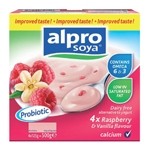Probiotics have a ‘good future’ despite EFSA

Speaking at a conference on health claims organised by Leatherhead Food Research yesterday (Thursday March 15), Dr Julian Stowell, responsible for scientific affairs at the Danisco Health & Nutrition division of DuPont, refuted press reports which suggested that the negative rulings by EFSA’s panel on dietetic products, nutrition and allergies (NDA) on probiotics could sound the death knell of these foods in Europe.
Stowell reported that DuPont was investing heavily in new research on probiotics based on rigorous science. The early results looked very promising, he added. This work was intended to ensure that the specific requirements of the NDA panel on dossier submissions were met.
"There are no short cuts to establishing sound science for all of these claims,” said Stowell. But he added: “No-one in the industry believes the probiotic category will disappear.”
Health claim
He pointed out that EFSA expected dossiers to be relevant to human health and establish a cause and effect for any health claim. “This is the most difficult aspect to address,” he said. “It is difficult to demonstrate the health benefit of a food compared with a medicine.”
But he also reported that there was now a better dialogue between stakeholders in the sector and with EFSA through the Global Alliance of Probiotics (GAP). This was established at the end of 2011 to promote understanding and awareness of probiotics and the recognition of their health benefits.
“We [GAP] believe that the viable solution involves dialogue with all stakeholders … and we would like to see more interaction with EFSA colleagues on a case-by-case approach before EFSA has to waste time evaluating dossiers that are absolutely going nowhere,” said Stowell.
“We are working hard – we have a lot of activities underway – and we are making really good progress and I am really excited. And, in the end, a positive way forward is going to be found for probiotics.”
NDA panel member Professor Ambroise Martin, from the Claude Bernard University in Lyon, speaking in a personal capacity, also expressed confidence that probiotics would eventually receive approval.
He explained that those submitting dossiers needed to meet the protocol for evidence submission in a form that was sought by the NDA panel for approval. Too many, he said, contained evidence in a form that was mainly aimed at being accepted for publication in peer reviewed scientific journals rather than to achieve health claims approval. He outlined the various steps necessary for a positive ruling.
No magic recipes
“It is more important to understand the rationale [for dossiers that are acceptable], rather than look for magic recipes,” he remarked. He stressed that studies should be designed to prove a claim. “I am sure that there will be a positive opinion [on probiotics] once the industry understands this new rule.”
Dossiers needed to provide better characterisation of food in relation to the claimed effect and the characterisation of the beneficial effect – some of the main reasons for many submissions being rejected, said Martin. Only then would the NDA panel examine evidence about the substantiation of the claimed effect – where human intervention studies in the target population become critical; assess whether the wording in dossiers reflected the scientific evidence; and establish conditions of use for the products.
“If the first two are done well, the third one [substantiation] is easy,” said Martin. “It is characterisation that should be really carefully scrutinised in relation to the claim.”

















